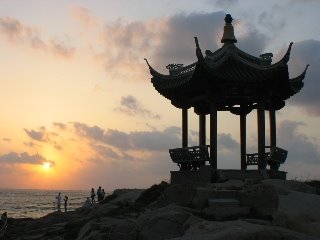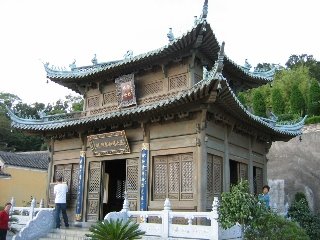 We joined a group of my co-workers last weekend for a visit to Putuo Shan, which translates to Buddha mountain. The Chinese pronunciation of Putuo is actually very close to the English pronunciation of Buddha. Putuo Shan is a mountain, but more importantly, it's also an island. It's beautiful, loaded with ornate Buddhist temples, and by Chinese standards anyway, it's unspoiled and not too crowded. There are crowds of tourists, for sure, but the island in general has a slow pace and relaxed vibe that's a welcome change from the hustle of the cities.
We joined a group of my co-workers last weekend for a visit to Putuo Shan, which translates to Buddha mountain. The Chinese pronunciation of Putuo is actually very close to the English pronunciation of Buddha. Putuo Shan is a mountain, but more importantly, it's also an island. It's beautiful, loaded with ornate Buddhist temples, and by Chinese standards anyway, it's unspoiled and not too crowded. There are crowds of tourists, for sure, but the island in general has a slow pace and relaxed vibe that's a welcome change from the hustle of the cities.The first night of our tour was spent in Zhou Shan (pronounced Joe Shahn), a larger island en route to Putuo Shan, in a rather seedy $15-per-night hotel on the waterfront. Our Chinese friends arranged the whole weekend's itenerary, so I presume this might be typical accomodations for this type of weekend getaway. We enjoyed a late meal under a tent on a mile-long row of seemingly identical outdoor seafood restaurants. The sign on each identical tent reads Seafood Night Snack. For our second night, on Putuo Shan itself, we were relieved to find the hotel had a very nice, almost luxurious lobby, but our hopes for an equally nice room were quickly dashed. We had to settle for a musty smelling, ant-infested room. Nevertheless, I'm grateful to my friends who arranged everything, and I figure I would have ended up with something even worse if I had tried to arrange it myself. It's all part of the genuine Chinese experience, as far as I'm concerned.

Of the dozens of temples we saw, most were centered around a large golden statue of the Buddha or some Boddhisattva (a figure who is on the path to enlightenment -- a future Buddha), the most important one here being Guan Yin, which is a feminine character representing compassion. At each temple, visitors lit incense, prayed, offered gifts and donations, and performed rituals designed to bring good luck, health, or wealth. One of the more memorable scenes for me was a group of Buddhist nuns gathered in a room near a temple, doors wide open, counting a mountain of cash from all the donations, in plain sight of the tourist mob. No bullet-proof glass here!
An interesting note is that the ubiquitous pot-bellied, bald-headed Chinese "Buddha" figure is in fact Hotei, another Boddhisattva whose image was apparently inspired by an actual Chan monk from the Liang Dynasty. This site has an interesting summary of the various Buddha images.
Organized tours are popular here, and annoying. Mobs of Chinese follow their megaphone-toting tour guide to all the big sights, everyone wearing the same cheap hats; the tour companies give everyone the same hats to wear, presumably so it's easier for the megaphone-meister to corral his/her mob with a high-decibal verbal assault.

The island even has a few nice beaches -- with one caveat. The ocean surrounding the island, as far as the eye can see (which is many miles from the Shan-tops), is the color of a mudslide. None of the tourists here will get beyond knee-deep in the water, either. Andrew still had fun in the sand and surf, though, making a major spectacle of himself when he went face first into the shallow water, getting his shirt and underwear (makeshift swimsuit) soaked, and again when mommy stripped him to his birthday suit to rinse off the sand.
A vendor had a bungy-jumping contraption on the beach, and we haggled them down to 20 RMB (about $2.50) per person for a chance to harness yourself in and launch yourself up and down doing kung-fu special effects.



1 comment:
Very nice and a pleasure to read. Please keep coming. Have a friend coming your way. Keep up good work.
Post a Comment